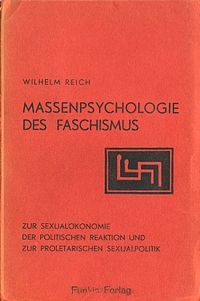
Pierre-Félix Guattari was a French psychoanalyst, political philosopher, semiotician, social activist, and screenwriter. He co-founded schizoanalysis with Gilles Deleuze, and ecosophy with Arne Næss, and is best known for his literary and philosophical collaborations with Deleuze, most notably Anti-Oedipus (1972) and A Thousand Plateaus (1980), the two volumes of their theoretical work Capitalism and Schizophrenia.

Gilles Louis René Deleuze was a French philosopher who, from the early 1950s until his death in 1995, wrote on philosophy, literature, film, and fine art. His most popular works were the two volumes of Capitalism and Schizophrenia: Anti-Oedipus (1972) and A Thousand Plateaus (1980), both co-written with psychoanalyst Félix Guattari. His metaphysical treatise Difference and Repetition (1968) is considered by many scholars to be his magnum opus.
Psychoanalysis is a theory developed by Sigmund Freud. It describes the human soul as an apparatus that emerged along the path of evolution and consists mainly of three parts that complement each other in a similar way to the organelles: a set of innate needs, a consciousness that serves to satisfy them, and a memory for the retrievable storage of experiences during made. Further in, it includes insights into the effects of traumatic education and a technique for bringing repressed content back into the realm of consciousness, in particular the diagnostic interpretation of dreams. Overall, psychoanalysis represents a method for the treatment of mental disorders.

Sigmund Freud was an Austrian neurologist and the founder of psychoanalysis, a clinical method for evaluating and treating pathologies seen as originating from conflicts in the psyche, through dialogue between patient and psychoanalyst, and the distinctive theory of mind and human agency derived from it.

Wilhelm Reich was an Austrian doctor of medicine and a psychoanalyst, a member of the second generation of analysts after Sigmund Freud. The author of several influential books, The Impulsive Character (1925), The Function of the Orgasm (1927), Character Analysis (1933), and The Mass Psychology of Fascism (1933), he became one of the most radical figures in the history of psychiatry.
Schizoanalysis is a set of theories and techniques developed by philosopher Gilles Deleuze and psychoanalyst Félix Guattari, first expounded in their book Anti-Oedipus (1972) and continued in their follow-up work, A Thousand Plateaus (1980).

A Thousand Plateaus: Capitalism and Schizophrenia is a 1980 book by the French philosopher Gilles Deleuze and the French psychoanalyst Félix Guattari. It is the second and final volume of their collaborative work Capitalism and Schizophrenia. While the first volume, Anti-Oedipus (1972), was a critique of contemporary uses of psychoanalysis and Marxism, A Thousand Plateaus was developed as an experimental work of philosophy covering a far wider range of topics, serving as a "positive exercise" in what Deleuze and Guattari refer to as rhizomatic thought.

Anti-Oedipus: Capitalism and Schizophrenia is a 1972 book by French authors Gilles Deleuze and Félix Guattari, the former a philosopher and the latter a psychoanalyst. It is the first volume of their collaborative work Capitalism and Schizophrenia, the second being A Thousand Plateaus (1980).
Desiring-production is a term coined by the French thinkers Gilles Deleuze and Félix Guattari in their book Anti-Oedipus (1972).
Freudo-Marxism is a loose designation for philosophical perspectives informed by both the Marxist philosophy of Karl Marx and the psychoanalytic theory of Sigmund Freud. Its history within continental philosophy began in the 1920s and '30s and running since through critical theory, Lacanian psychoanalysis, and post-structuralism.
A rhizome is a concept in post-structuralism describing a nonlinear network. It appears in the work of French theorists Deleuze and Guattari, who used the term in their book A Thousand Plateaus to refer to networks that establish "connections between semiotic chains, organizations of power, and circumstances relative to the arts, sciences and social struggles" with no apparent order or coherency. A rhizome is purely a network of multiplicities that are not arborescent with properties similar to lattices. Deleuze referred to it as extending from his concept of an "image of thought" that he had previously discussed in Difference and Repetition.
A line of flight or a line of escape is a concept developed by Gilles Deleuze and Félix Guattari in their work Capitalism and Schizophrenia. It describes one out of three lines forming what Deleuze and Guattari call assemblages, and serves as a factor in an assemblage that ultimately allows it to change and adapt to said changes, which can be associated with new sociological, political and psychological factors. Translator Brian Massumi notes that in French, "Fuite covers not only the act of fleeing or eluding but also flowing, leaking, and disappearing into the distance. It has no relation to flying."
Janine Chasseguet-Smirgel was a leading French psychoanalyst, a training analyst, and past President of the Société psychanalytique de Paris in France. From 1983 to 1989, she was Vice President of the International Psychoanalytical Association. Chasseguet-Smirgel was Freud Professor at the University College, London, and Professor of Psychopathology at the Université Lille Nord de France. She is best known for her reworking of the Freudian theory of the ego ideal and its connection to primary narcissism, as well as for her extension of this theory to a critique of utopian ideology.
Otto Fenichel was a psychoanalyst of the so-called "second generation". He was born into a prominent family of Jewish lawyers.
Gilles Deleuze, a French philosopher, and Félix Guattari, a French psychoanalyst and political activist, wrote a number of works together.

The Mass Psychology of Fascism is a 1933 psychology book written by the Austrian psychoanalyst and psychiatrist Wilhelm Reich, in which the author attempts to explain how fascists and authoritarians come into power through their political and ideologically-oriented sexual repression on the popular masses.
Within the work of the Austrian psychoanalyst Wilhelm Reich (1897–1957), orgastic potency is a human's natural ability to experience an orgasm with certain psychosomatic characteristics and resulting in full sexual gratification.

What is Philosophy? is a 1991 book by the philosopher Gilles Deleuze and the psychoanalyst Félix Guattari. The two had met shortly after May 1968 and collaborated most notably on Capitalism & Schizophrenia and Kafka: Towards a Minority Literature (1975). In this, the last book they co-signed, philosophy, science, and art are treated as three modes of thought.
Lacanianism or Lacanian psychoanalysis is a theoretical system that explains the mind, behaviour, and culture through a structuralist and post-structuralist extension of classical psychoanalysis, initiated by the work of Jacques Lacan from the 1950s to the 1980s. Lacanian perspectives contend that the human mind is structured by the world of language, known as the Symbolic. They stress the importance of desire, which is conceived of as perpetual and impossible to satisfy. Contemporary Lacanianism is characterised by a broad range of thought and extensive debate among Lacanians.

Francis Bacon: The Logic of Sensation is a 1981 book by philosopher Gilles Deleuze, analyzing the work of twentieth-century British figurative painter Francis Bacon. In this biography, Deleuze discusses aesthetics, objects of perception ('percepts'), and sensation.










